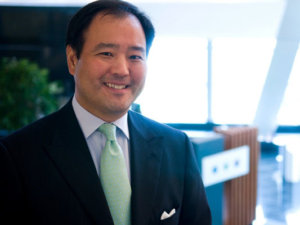Meet Jon Iwata: A Q&A With Your 20th Koten Distinguished Lecturer
Published on March 28, 2018, at 10:33 a.m.
by Skylar Spencer.

Meet Jon Iwata: the former senior vice president and chief brand officer for IBM — and the keynote speaker for the 20th Koten Distinguished Lecture Series in Public Relations at The University of Alabama.
Iwata will deliver the lecture, titled “Authentic Communications in a Time of A.I., Big Data and Fake News,” on Thursday, March 29. But why does he matter to you?
Iwata has been instrumental in the recognition of IBM’s 107-year-old brand as one of the most valuable in the world — through positioning the company as a global agenda-setter, engaging its stakeholders and stewarding the brand into the future.
Iwata gives us a glimpse into his 34-year journey at IBM, offering an unparalleled perspective from one of the most recognized leaders in communications, marketing, advertising and corporate citizenship.
Q: You were recently appointed as executive-in-residence at Yale, so can you tell my readers about what that position entails?
A: When I retired from IBM earlier this year, the associate dean reached out and described to me their “executive-in-residence” role. It sounded ideal because it would allow me to interact with faculty and the students of the School of Management in a flexible way. So I’ll be spending a day a week there, doing some guest lecturing and roundtables with faculty and graduate students. I hope to do some research in conjunction with the school, as well.

Q: I’ve observed IBM over the last 25-30 years through my research, and the company has been able to set agendas for industries, making entirely new markets. How do you go about mobilizing the entire company’s strategy like that?
A: IBM is 107 years old this year. It’s unheard of for a technology company to make it to 100 — most don’t last more than 10 or 25 years. The only reason why IBM has been able to do this is because we’ve reinvented ourselves many, many times in our history. We have to keep moving with each new generation of innovation, so the need for a company to articulate and project a point of view — not only about new technology but how it’s going to change business and society — is important.
It does require courage at times because, by definition, you are talking about something very few people have heard of, understand or think they need — whether it’s the internet in the 1990s or more recently with artificial intelligence and Watson, taking the technology out of the realm of science fiction and saying that it’s going to become a part of everyday life. All of this requires IBM to engage in conversation with businesses, consumers, academics and government about new realities shaped by technology. Making markets requires this kind of work.
Q: I understand you have personally served three IBM CEOs throughout your career. As a communications advisor, how did you adapt to the personalities of three CEOs and each of their agendas and business requirements?
A: It is unusual to go from one CEO’s team to another. I think a couple of things have helped. One is my focus on IBM’s interests. While each CEO is a unique individual, of course, each has focused on the best interests of the company. This has given me common purpose and alignment with each CEO.
Having said that, people are different. One of the things I’ve learned is the need for me to adapt, not just to personalities and different leadership styles, but to how each CEO learns. This is not the same thing as how they interact interpersonally or how they lead. It’s how they actually come to believe and act upon ideas. Every one of us learns in a different way. Trying to understand the differences between the three CEOs has been enormously important. By the way, no one tells you how they learn. You have to observe it.

Q: I’ve talked to people who have worked with you, and one thing that’s recurred is your insistence on very high standards and expectations. Can you talk about how you instill that in an organization?
A: Well, it started with what I was taught coming into IBM — that we believe in excellence in everything we do. My managers really upheld and instilled that. They gave me lots of feedback to improve what I did, in every dimension — writing, conducting a meeting, hosting a meeting, putting together a recommendation or report — everything was to be done in the best possible way. That stayed with me throughout my career.
So, when I moved into positions of leadership, it was second nature to say to the team, “Somebody in the world is going to produce the best ____. Why not us? What prevents us from performing at that level?” I don’t think it’s any more complicated than making a personal commitment to be excellent and to hold each other to that standard. I’ve invited the team continually to ask themselves: “Are we doing great work? If not, what is it going to take for us to do that?”
Q: Can you explain your perspective on the impact of data in communications?
A: Data is often misunderstood in business. Many think of data as research or as measurement or metrics. Data, to me, is more like instrumentation. It’s not trying to approximate something; it’s not asking for peoples’ opinion. It’s capturing and understanding what’s happening right now.
In the communications field, often people say, “We need more research,” meaning we need to do focus groups, we have to do surveys, we have to ask for people’s opinions. That’s fine because what alternatives existed? Today, with the rise of digital, we can actually understand what people are saying, doing, looking for, liking, right now, in the moment. That’s phenomenally valuable data. It’s real-time data that we can act upon, and I don’t think we’re using enough of it to understand the stakeholders we care about. And the biggest shift that data enables is to go from understanding and engaging stakeholders as populations and segments to understanding them as unique individuals. They are telling us who they are instead of us telling them who they are through crude segmentation models. And they want to be engaged as unique individuals. The only way we can do that is through data.
Q: Looking back, what is something you’re most proud of?

A: IBM has the opportunity and responsibility to articulate a point of view about how the world will change, driven by technology. In 2008, we developed a view about the historic growth of data being created by putting technology into literally everything. This will allow people to know what was previously unknowable — Where will the blackout occur? What are the sources of insurance fraud? When will this piece of heavy equipment fail, so that we can prevent that? Where will the traffic jam form? What do consumers really want? We can actually answer, through data, these kind of age-old questions. So, we came up with this point of view, and we branded it a “Smarter Planet.” We prepared it for launch in a very big way.
But then the financial crisis hit in September 2008. Some people were saying it was going to be the next Great Depression. So our CEO at the time, Sam Palmisano, and I had a candid discussion. Sam said, “This may be the worst time to launch something like this because we may look out of touch.” Well, we agreed to sleep on it, and the next day we both came up with the same answer: This is the ideal time to launch Smarter Planet because the world needed a fact-based reason to be optimistic. We launched in November of 2008.
It was a courageous thing for Sam to have approved, and it worked out rather well for IBM and it gave a lot of people a reason to be optimistic about the future. I’m very proud of the creation of Smarter Planet as a strategic point of view, in the creative work that supported it through advertising, public relations and public policy, and I’m proud to have been part of a team that decided to go at the moment when the world was falling apart. Those were circumstances no one wished for, but it turned out to be the right thing to do.
Q: With all of the changes taking place around us, what advice would you have for someone entering in the profession now?
A: There are three things:
One is to work on the fundamentals of writing and critical thinking. I can’t emphasize this enough. The ability to think critically and express your thinking through writing — through strong, clear writing — is going to differentiate you. This is not the same thing as writing tweets or blog posts. There’s good practice there — I think it’s harder in some respects to be coherent, crisp, witty and clear in a short number of words than to write pages. It’s a muscle, it’s a skill, and it can be built and strengthened with practice. Thinking, composing a point of view and expressing that in writing is a cornerstone skill, and it will always be.
Number two is, and this is basic, to be a person of good character. This is your work ethic. This is your authentic behavior. As you go through business life — and as you go through life — your personal brand will be a combination of your professional skill and your personal character. Your ethical behavior, your honesty, your ability to work with others, your ability to keep your ego in check, all of these matter a lot.
Lastly, I didn’t start with this because it’s not as important as the first two points. It is to be committed to understanding this new reality around technology, data, artificial intelligence. These are the new tools of our profession. You’ve got a head start because, generationally, you grew up with this stuff, it comes naturally to you. But using it as a consumer and understanding how to use it in business aren’t the same thing. Be committed to understanding and mastering these new tools. It will differentiate communicators and marketers for the next quarter century.
The Plank Center’s Koten Lecture provides you with an opportunity to discuss pressing issues in public relations. If you would like to hear more insights and advice from Iwata, the lecture will be held Thursday, March 29, at 9:30 a.m. in 216 Reese Phifer Hall.




